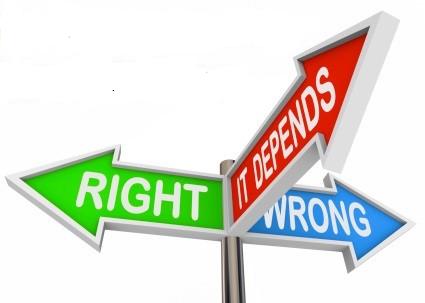Nobody can deny that there has to be a moral consensus about what is right and what is wrong in order to have a coherent moral society. The question nobody has been able to answer to most people’s satisfaction is: How do you craft an obligatory morality that all may consent to without ascribing the source of that morality to God? If there is to be an absolute standard for morals, it certainly cannot be found in the laws of society. The reason for this is that nobody can dictate an absolute sense of law on their own authority.
Though some people think abortion is right, some think it is wrong; the law cannot be so schizophrenic as to allow that it is both right and wrong. But isn’t it one or the other? Society cannot allow us to choose whether or not we may ignore the law. But if the government is going to establish laws, it must have a higher authority than itself upon which to base those laws. If the authority of a just God is not to be invoked, society cannot determine what laws must be followed except by a vote of the majority of those who enact the laws. While in a practical way this seems the most desirable compromise, it is not necessarily so. The reason is that the majority can be wrong, and in some cases deadly wrong. One sees this, for example, in the case of a mob lynching an innocent victim. Such an act is not likely to occur inside a church in the presence of a priest.
The absence or suppression of religious institutions in a society is a sure recipe for immoral laws. The conduct of the courts in the Soviet Union during the reign of the dictator Josef Stalin and in Germany under Adolf Hitler are perfect examples of how corrupt a society can become when established religion is persecuted or ignored.
Religion is the traditional institution by which moral values are conveyed from one generation to the next. This is why, when people suppress religious institutions, there is usually a fierce reaction that sets in. People lose respect for the old morals because they have lost respect for, and loyalty to, their religious convictions. Thus criminal activity will greatly increase. We see this especially among the majority of convicted criminals who, sent to prison, often admit that, even if baptized, they have had little or no religious instruction in their childhood. We see the principle applied also by the lower recidivism rate (percent of prisoners who return to prison after their release) of convicts who have taken advantage of services provided by prison chaplains, and who have developed a prayer life prior to their release from prison.
Principals of parochial schools can attest to the numerous students accepted for enrollment whose parents do not have any religious convictions whatever. Such parents recognize that the religious schools offer a firmer foundation in morals than the public ones. This is all the more true today as we see the behavioral problems rampant in public schools, especially those schools where the teachers and the administration are notably antagonistic toward any expressions of religious sentiment or thought, and where the textbooks and lesson plans may even contain propaganda materials that parents would consider to be downright immoral or lunatic.
Hardly anyone with an education in morals will deny that the times we live in are less moral than the times we grew up in. Children are prey to all kinds of insidious influences by the many corrupt champions of depraved music, movies, books, and television. All these influences, working against the interests of children and a sense of common decency, are supposedly protected by the First Amendment according to the perpetrators of moral decline. But it does not seems likely that the Founders of the U.S. Constitution meant the First Amendment for the protection of foul language, not to mention pornography. They meant free speech not for the protection of sensational and indecent images, but for the defense of ideas. Sometimes it seems that the only right to free speech not protected by the First Amendment is the idea that parents have a right to speak out against those who use it to violate the innocence of their children.
A final thought: “No man’s religion ever survives his morals.” Robert South

